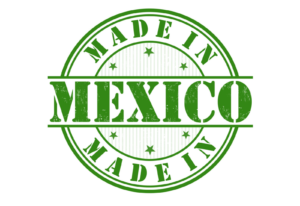Over the past couple of years, we’ve written more than once (and here) that Mexico is fast-increasing in importance as a manufacturing hub, especially for businesses targeting the U.S. market. To recap, as global companies seek to diversify their supply chains, Mexico offers proximity to U.S. markets, modern infrastructure, access to ports for global distribution and a highly skilled, well-educated workforce.
Mexican companies, of course, have known this for 150 years, and U.S. goods imports from Mexico totaled $358.0 billion in 2019, up 4.0% ($13.7 billion) from 2018, and up 102.6% from 2009. The top import categories in 2019 were: vehicles ($101 billion), machinery ($66 billion), electrical machinery ($64 billion), agricultural products ($28 billion), optical and medical instruments ($16 billion), and mineral fuels ($13 billion). U.S. imports of services from Mexico totaled an estimated $29.8 billion in 2019, 6.8% ($1.9 billion) more than 2018, and 92.0% greater than 2009 levels. Leading services imports from Mexico to the U.S. were in the travel, transport, and technical and other services sectors. We have recently been seeing a big uptick in U.S. companies looking to set up service businesses in Mexico to provide web design, translating, telephone, and product design services.
Most of Mexico’s exports to the United States target the general population, but a significant portion target the very large Latino community, which collectively had a total economic output of $2.7 trillion in 2019, equal to the seventh-largest GDP in the world if U.S. Latinos were an independent country. In addition, the GDP growth from 2010 to 2019 for U.S Latinos outpaced that of Germany, the United Kingdom and Japan. U.S. Latino economic output was especially strong in education and health care ($446 billion) professional and business services ($327 billion) and finance and real estate ($252 billion).
If you are a growing Mexican company with ambitions to target the world’s largest consumer market, you will be happy to know that a substantial portion of your potential customers are Spanish speaking.
But though the U.S. is inarguably an attractive market, it is also a complex and highly regulated place to do business. Companies looking to establish operations in the United States need to abide by federal, state, and local laws and regulations governing licensing, marketing, labor, the environment, safety, (employee and consumer) privacy, taxation and more. As an example, the U.S. Department of Labor (DOL) administers and enforces more than 175 employment-related federal laws in areas such as recruiting, hiring, background checks, compensation and benefits, workplace conduct and termination.
Companies entering the U.S. market for the first time must consider the legal structure of their operations, a consideration that should take into account the differences in state laws as well as federal law. The most common types of U.S. business entities are corporations, limited liability companies (LLCs), and partnerships, each of which has benefits (and liabilities) depending on case-specific business objectives.
Business contracts are governed by state law. All 50 states have adopted some variation of the Uniform Commercial Code (UCC), which generally applies to any contract for the sale of goods over $500, but in the case of a dispute, courts generally will interpret written agreements based on the plain language of the writing, the parties’ conduct, industry custom, and applicable laws, with the UCC used to fill in any gaps not addressed by the contract. It is worth noting also that because U.S. contracts are governed by state rather than federal laws, all contracts should include a “choice of law” clause that designates which state’s laws to use in interpreting the agreement. Similarly, a contract may include a “choice of venue” clause that designates the state in which a lawsuit may be brought to enforce the contract. Making these selections allows for predictability and avoids litigation in unfamiliar or distant jurisdictions.
Similarly, given the complexity of U.S. tax law, careful tax planning and counsel is important for all companies doing business in the U.S. Companies operating in the U.S. are subject to separate federal, state, and local taxes. The U.S. is party to bilateral tax treaties with numerous foreign countries; these treaties aim to prevent double taxation and tax evasion, as well as to facilitate commerce between countries, and the relevant tax treaties should be consulted as primary tax planning tools. Foreign individuals and companies doing business in the U.S. are also subject to the Foreign Investment in Real Property Tax Act (FIRPTA), which applies a tax to the disposition of any interest in real property in the U.S., regardless of the taxpayer’s residency.
There are many, many more laws and regulations governing business operations in the U.S., but what’s most important is to be as informed as possible about the operational and legal contexts that are relevant to your business, and to get sound legal advice every step of the way when you’re making investment and business decisions.
Unfortunately, in late 2018 Mexico’s Ministry of Economy ordered ProMexico to close all its offices abroad and within Mexico. The impact of this can hardly be understated. Under the past two federal administrations, ProMexico had set up 46 offices abroad and had become a very visible and highly regarded face for Mexico trade and investment promotion. No frontline links between Mexican companies and international markets exist now (INADEM, the agency created to assist SMEs in Mexico has also discontinued its operations) and trade promotion tasks abroad are now being entrusted to Mexico’s embassies and consulates.
Harris Sliwoski provides strategic legal solutions for domestic and international companies doing business and facing legal disputes on four continents, and we have supported hundreds of European, Asian and Latin American companies with U.S.-bound foreign direct investment (FDI). Our Foreign Direct Investment practice group includes lawyers fluent in Spanish, Mandarin Chinese, German and French who are experts in U.S. laws, regulatory environments and the broader global trade context, and our advice incorporates all these elements as we help our clients develop winning strategies.
Para leer este artículo en español, haga clic aquí.

























